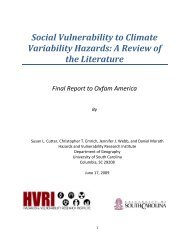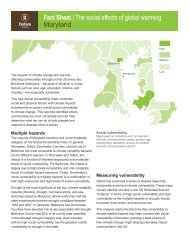Poverty Footprint Study on how the Coca Cola - Oxfam America
Poverty Footprint Study on how the Coca Cola - Oxfam America
Poverty Footprint Study on how the Coca Cola - Oxfam America
You also want an ePaper? Increase the reach of your titles
YUMPU automatically turns print PDFs into web optimized ePapers that Google loves.
Recommendati<strong>on</strong>s for follow-up acti<strong>on</strong><br />
Engage sugar farmers and producers to<br />
improve safety and health of sugarcane<br />
harvesters.<br />
Investigate why independent truck drivers<br />
in Zambia work more than eight hours<br />
per day and discuss with drivers potential<br />
mechanisms to ensure safe driving.<br />
Diversity and women’s participati<strong>on</strong><br />
Women represent a large proporti<strong>on</strong> of <strong>the</strong> world’s<br />
poor and face unique barriers when seeking<br />
educati<strong>on</strong>, employment and health care. Women<br />
are more likely than men to be denied basic rights;<br />
<strong>the</strong>y often have a limited role in decisi<strong>on</strong> making and<br />
are more vulnerable to violence. Investing in gender<br />
equality can help drive ec<strong>on</strong>omic growth. Studies<br />
have s<strong>how</strong>n that when women’s incomes increase,<br />
family health, educati<strong>on</strong> and well-being improve. 7<br />
Women involved in sugar growing and harvesting<br />
face traditi<strong>on</strong>al gender biases, hindering <strong>the</strong>ir ability<br />
to earn an income, own land, access credit and build<br />
skills. Women are often dependent <strong>on</strong> men and have<br />
limited ec<strong>on</strong>omic opportunities in both countries,<br />
although in El Salvador <strong>the</strong> circumstances are<br />
slightly more positive.<br />
Despite formal antidiscriminati<strong>on</strong> policies at <strong>the</strong><br />
SABMiller bottling plants in both countries, women<br />
remain underrepresented, a challenge c<strong>on</strong>sistent with<br />
manufacturing employment statistics <strong>the</strong> world over.<br />
Recommendati<strong>on</strong>s for follow-up acti<strong>on</strong><br />
Establish focused business training and<br />
support for women in <strong>the</strong> <strong>Coca</strong>-<strong>Cola</strong>/<br />
SABMiller value chain to work toward<br />
more equal employment opportunities.<br />
Make fur<strong>the</strong>r efforts to recruit women<br />
for n<strong>on</strong>traditi<strong>on</strong>al and senior<br />
management jobs.<br />
C<strong>on</strong>sider ways to increase women<br />
business partners’ access to credit, taking<br />
into account <strong>the</strong> unique circumstances<br />
women face when running businesses<br />
in <strong>the</strong>se communities.<br />
Research <strong>how</strong> operati<strong>on</strong>s and practices<br />
in <strong>the</strong> value chain empower or undermine<br />
small women farmers.<br />
16 Exploring <strong>the</strong> links between internati<strong>on</strong>al business and poverty reducti<strong>on</strong><br />
Formal jobs in <strong>the</strong> value chain are dominated by men,<br />
and <strong>the</strong>re is gender segmentati<strong>on</strong> by occupati<strong>on</strong>,<br />
type of activity and level of seniority. Several factors<br />
have led to this imbalance, including <strong>the</strong> percepti<strong>on</strong><br />
that jobs in <strong>the</strong> beverage industry are more suited<br />
to men due to <strong>the</strong> requirement of physical strength<br />
and <strong>the</strong> lack of security for workers who travel l<strong>on</strong>g<br />
distances to work.<br />
Women do play a significant role in <strong>the</strong> <strong>Coca</strong>-<strong>Cola</strong>/<br />
SABMiller value chain at <strong>the</strong> retail level. Of <strong>the</strong><br />
approximately 64,000 retail outlets in El Salvador,<br />
an estimated 76 percent8 are owned by women. In<br />
Zambia, an estimated <strong>on</strong>e third of <strong>the</strong> approximately<br />
25,000 retail outlets are estimated to be owned by<br />
women. Both bottling plants offer training workshops<br />
for small retailers; <strong>how</strong>ever, limited access to credit<br />
often limits business expansi<strong>on</strong>.<br />
Local envir<strong>on</strong>mental impacts:<br />
Water and recycling<br />
Climate change threatens water access in many<br />
countries and it is vital that water is resp<strong>on</strong>sibly and<br />
strategically managed. The greatest use of water<br />
in <strong>the</strong> <strong>Coca</strong>-<strong>Cola</strong>/SABMiller value chain occurs in<br />
sugar producti<strong>on</strong>. This is c<strong>on</strong>sistent with <strong>the</strong> fact that<br />
agriculture in general uses approximately 70 percent<br />
of freshwater globally, compared with <strong>the</strong> 20 percent*<br />
used by industry. Sugar fields are often irrigated via<br />
flood irrigati<strong>on</strong>, and sugarcane processing requires<br />
water for cleaning.<br />
In both Zambia and El Salvador, significant parts<br />
of <strong>the</strong> value chain are located near water sources<br />
that serve multiple purposes—domestic, agricultural<br />
and industrial. The main issues characterizing <strong>the</strong><br />
water debate are access in Zambia and scarcity in<br />
El Salvador. In Zambia, water usage associated with<br />
increasing sugarcane producti<strong>on</strong> is leading to c<strong>on</strong>flict.<br />
In both countries, this study revealed <strong>the</strong> paramount<br />
importance of open and transparent dialogue with<br />
communities about water. Both ILC and Zambian<br />
Breweries engage in regular dialogue <strong>on</strong> this<br />
topic with communities surrounding SABMiller’s<br />
bottling plants.<br />
Efforts are under way through The <strong>Coca</strong>-<strong>Cola</strong><br />
Company’s participati<strong>on</strong> in B<strong>on</strong>sucro, formerly<br />
called <strong>the</strong> Better Sugarcane Initiative, to develop<br />
a producti<strong>on</strong> standard and certificati<strong>on</strong> scheme for<br />
sustainable sugar and ethanol from sugarcane.<br />
In additi<strong>on</strong>, The <strong>Coca</strong>-<strong>Cola</strong> Company has teamed<br />
up with sugarcane producers to launch pilot projects<br />
aimed at benefitting both <strong>the</strong> producer and <strong>the</strong><br />
envir<strong>on</strong>ment, including in El Salvador.<br />
SABMiller’s bottling plants in both countries are<br />
engaged with communities <strong>on</strong> water issues. The full<br />
treatment of wastewater by both bottling plants has<br />
been well received by <strong>the</strong>ir communities, particularly<br />
in El Salvador where municipal water treatment plants<br />
are lacking. The discussi<strong>on</strong> <strong>on</strong> wastewater treatment<br />
*http://www.unesco.org/water/iyfw2/water_use.shtml




